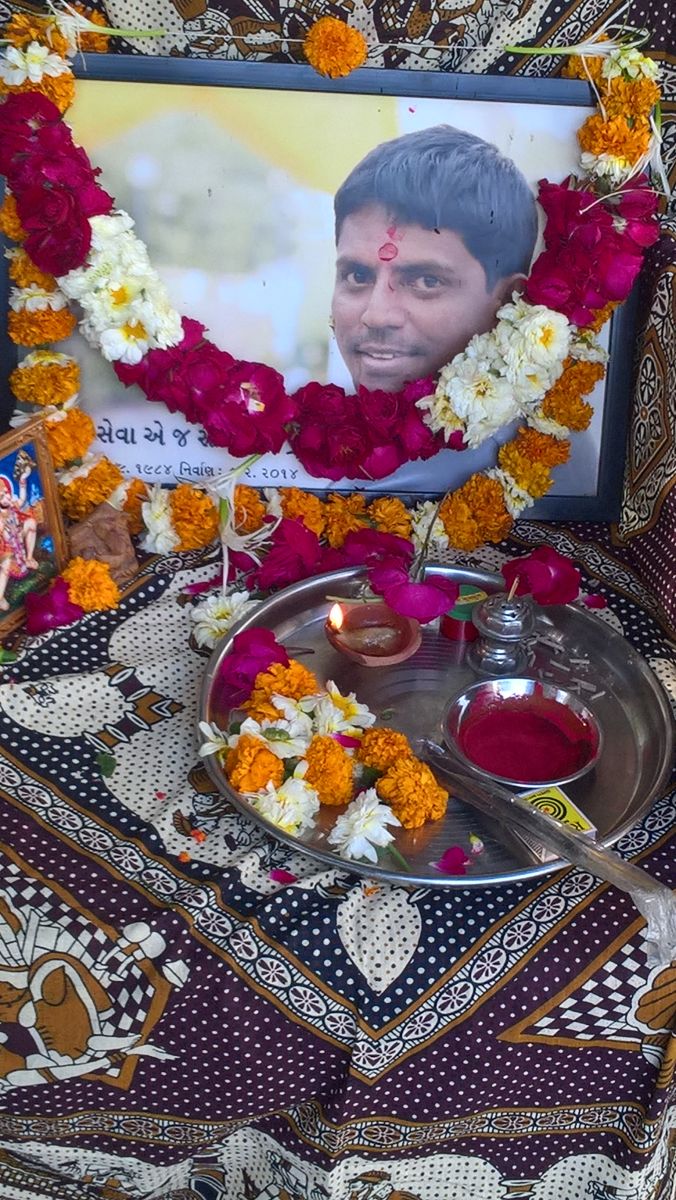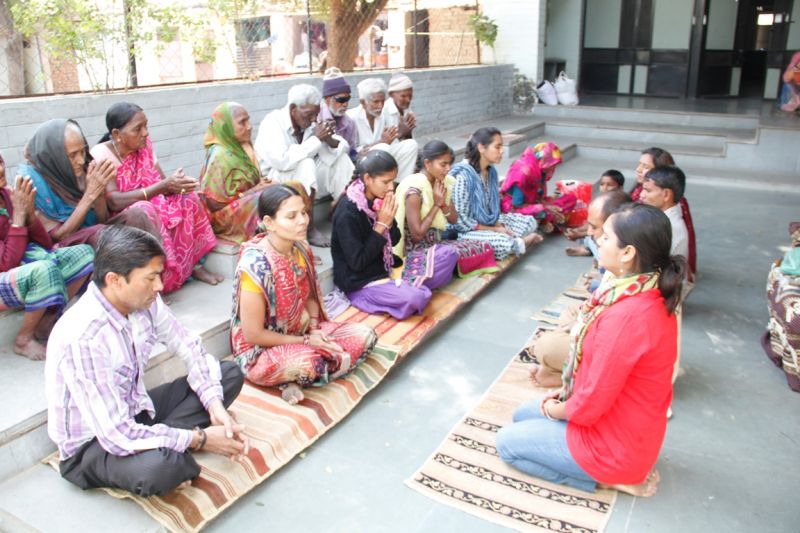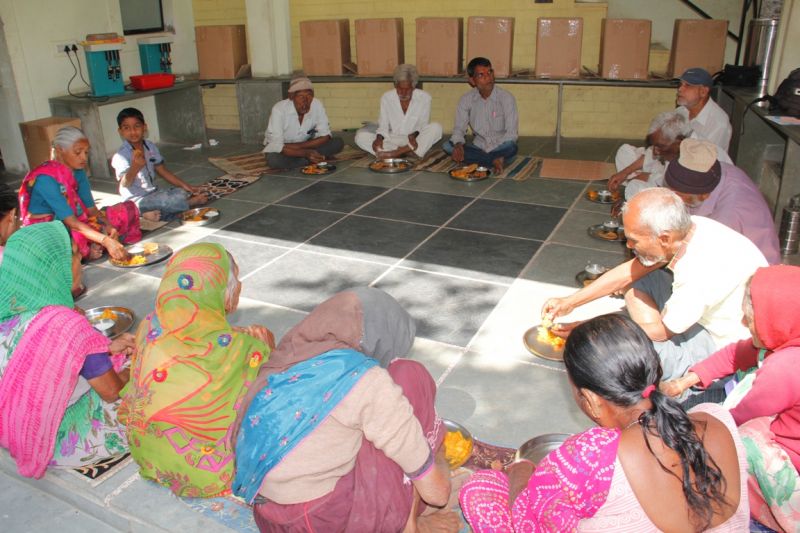A Few Tributes In The Gandhi Ashram Ecosystem (at

The morning of Feb. 8, 2017 was planned for a special morning prayer, at the Rudra Center (of Gramshree) at 11am, in tribute to a giving spirit, Mr. Raghubhai Bhallabhai Makwana. The afternoon at 2:30pm was planned for an activity at the Ashramshala in remembrance of Raghubhai. There was also a memorial in his memory at ESI-Sughad campus.
Rameshbhai Vasava, who now conducts Tyaag Nu Tiffin service, had sent me a message at 5:30am that morning to invite me to come to Rudra Center for prayer that day. Various other people close to Raghubhai were invited, including Jayeshbhai, a mentor to many, who led a short talk and prayer, Jyotsanaben who sang a bhajan/devotional song, Punitbhai (who photographed that morning), Beenaben (Raghubhai’s fiancé who was an anganwadi teacher with Manav Sadhna before) and the majis and kakas fed through Tyaag Nu Tiffin (there are about 5 original recipients of Tyaag Nu Tiffin that are still alive and served through the program).
Jalabaa, a maji/elder widow who also knew Raghubhai, opened the morning with expressions of missing Raghubhai. I felt our hearts opened more after that. A diya/oil lamp was lit by Rameshbhai and Beenaben in front of a beautiful photo of Raghubhai (courtesy of Punitbhai) that was draped in a garland of orange marigold and white daisy flowers. Beenaben brought a garland of red and white rose flowers to put on the photo. Vermillion/sindhur paste was kept in a small bowl for people to apply to the photo.
​​​​​​​Jayeshbhai spoke about the meaning of the name Raghu and he being with Ram now, and how some people worship statues, while others worship life and are blessed and fortunate to come across and meet beings that express divinity. He spoke about dil-ka-kaam/heart work and the bada dil-ability/big heart-ability Raghubhai displayed in his work and connection with others-- through the heart, regardless of language differences or organizational affiliations. It reminded me of some reflections I witnessed and jotted down in various ways, including as a PowerPoint presentation, during and after his passing (https://m.youtube.com/watch?feature=youtu.be&v=9QvPtrdH1Os; the PPT was graciously put to music and put on YouTube, courtesy of Abhishek Jana, a youth who knew Raghubhai well and who offered to do this without me asking).
​​​​​​​Jyotsnaben shared, “It was a soulful time sharing when we were offering food+love=Prasad to those elderly mothers & fathers. That time was about giving love and receiving blessings. It was not about sorrow, but it was about love, care and compassion. Raghubhai did not die; instead he is living in everyone's heart with love.”
She shared a bhajan:
Aankho pavitra raakh, saachu tu bol,
Ishwar dekhase tane premal no kol,
Saty ejj parmeshwar baapu no bol,
Tara ma parmeshwar chhe tene shodh
Meaning:
Keep your eyes holy, always speak the truth
You will see God within all His lovely creation
Truth is God, These are the words of Bapu
Find God, He is only within you
I had gone to Morning Prayer at Manav Sadhna and had planned an afternoon activity at the Ashramshala hostel with Varshaben, Ashramshala coordinator and teacher who was receptive and open to putting in some extra work and making time for a translation. It was a reading, watching, and listening activity with the children, who live there, about Raghubhai’s life. As a touching tribute of inspiring lessons connecting themes of love and respect, it fit the value of respect for the month of February that the center focused on. Varshaben summarized a chapter called ‘The Warrior of Love’ from English to Gujarati from the book “What Can I Give?” about the life of Dr. A.P.J. Abdul Kalam by one of his students/mentees, Srijan Pal Singh. The chapter seemed strikingly similar to what I witnessed and wrote about (though, with a few errors in dates mentioned in the book), detailing some key life lessons from the life of Raghubhai. We played the PowerPoint of still images and words to background flute music to the song Raghupati Raghav Raja Ram played by Pandit Ronu Majumdar. One of Raghubhai’s younger nieces, Sangeeta, a student at the Ashramshala, cried during it. We also played two YouTube clips, which friend Amitbhai had recorded and posted, of Raghubhai singing bhajans/devotional songs.
​​​​​​​Ashramshala teacher Varshaben asked me if I’d like to say anything after playing the slideshow and bhajans, as I had worked with Raghubhai for about 9 months. I shared that if each of us took some lesson learned and implemented it in our own lives, it will be a tribute to the legacy of an inspiring person and in that way (as well as in others) the spirit of the person does not die. Even something small and simple like smiling more, connecting more from the heart-space, and putting the spirit/bhav in our work, can be lived.
"The best portion of a good man's life: His little...nameless…unremembered acts of Kindness and of Love.” --William Wordsworth
Posted by Varsha Mathrani on Mar 8, 2017


.JPG)
.JPG)



On Mar 12, 2017 Suchi wrote:
Post Your Reply